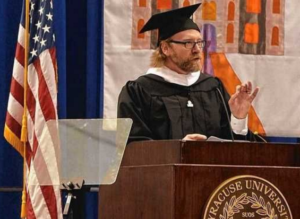Do you like to hear a great speech occasionally? A short one on a meaningful topic. Here is an awesome commencement speech on kindness. A short one on a very meaningful topic by George Saunders, an American writer of short stories, essays, novellas, and children’s books and a Professor at Syracuse University.

Changing the way you look at kindness can change your thinking of kindness.
When you change the way you look at things, the things you look at change.
Wayne Dyer
Related: How to Give a Smashingly Enjoyable and Compelling Speech
With his gentle wisdom and disarming warmth, Saunders manages to dissolve some of our most deeply ingrained thinking on kindness. Let’s look at how he does this:
Lead in that sets the stage and enlightens the audience that the speaker doesn’t like ego and appreciates a little humor.
I like this opening, as the ego is one of my ‘hot buttons.’ And a little humor without telling a joke is a great way to break the ice.
Down through the ages, a traditional form has evolved for this type of speech, which is: Some old fart, his best years behind him, who, over the course of his life, has made a series of dreadful mistakes (that would be me), gives heartfelt advice to a group of shining, energetic young people, with all of their best years ahead of them (that would be you). …
What is the topic about … the question of regrets. Good topic for a young audience starting out in life, yes?
There is no such thing as a life without any regrets. However, regrets can become either burden that interferes with your present happiness and restricts your future, or motivation to move forward. Capture the motivation.
Now, one useful thing you can do with an old person, in addition to borrowing money from them, or asking them to do one of their old-time “dances,” so you can watch, while laughing, is ask: “Looking back, what do you regret?” And they’ll tell you. Sometimes, as you know, they’ll tell you even if you haven’t asked. Sometimes, even when you’ve specifically requested they not tell you, they’ll tell you.

So: What do I regret? Being poor from time to time? Not really. Working terrible jobs, like “knuckle-puller in a slaughterhouse?” (And don’t even ASK what that entails.) No. I don’t regret that. …
Do I regret the occasional humiliation? Like once, playing hockey in front of a big crowd, including this girl I liked, I somehow managed, while falling and emitting this weird whooping noise, to score on my goalie, while also sending my stick flying into the crowd, nearly hitting that girl? No. I don’t even regret that.
The main body of the speech opens with a personal story from Saunders.
Stories are the age-old way to share our experience. Stories enlighten, entertain, inspire, and move us to action.
But here’s something I do regret:
In seventh grade, this new kid joined our class. In the interest of confidentiality, her Convocation Speech name will be “ELLEN.” ELLEN was small, shy. She wore these blue cat’s eyeglasses that, at the time, only old ladies wore. When nervous, which was pretty much always, she had a habit of taking a strand of hair into her mouth and chewing on it.
So she came to our school and our neighborhood, and was mostly ignored, occasionally teased (“Your hair taste good?” — that sort of thing). I could see this hurt her. I still remember the way she’d look after such an insult: eyes cast down, a little gut-kicked, as if, having just been reminded of her place in things, she was trying, as much as possible, to disappear. After a while she’d drift away, hair-strand still in her mouth. At home, I imagined, after school, her mother would say, you know: “How was your day, sweetie?” and she’d say, “Oh, fine.” And her mother would say, “Making any friends?” and she’d go, “Sure, lots.”
Sometimes I’d see her hanging around alone in her front yard, as if afraid to leave it.
And then — they moved. That was it. No tragedy, no big final hazing.
One day she was there, the next day she wasn’t.
End of story.
The heart of the question why?
Now, why do I regret that? Why, forty-two years later, am I still thinking about it? About most of the other kids, I was pretty nice to her. I never said an unkind word to her. In fact, I sometimes even (mildly) defended her.
But still. It bothers me.
So here’s something I know to be true, although it’s a little corny, and I don’t quite know what to do with it:
What I regret most in my life are failures of kindness. …
It’s a little facile, maybe, and certainly hard to implement, but I’d say, as a goal in life, you could do worse than Try to be kinder.
Now, the million-dollar question: What’s our problem? Why aren’t we kinder?
Here’s what I think:
The motivation.
Each of us is born with a series of built-in confusions that are probably somehow Darwinian. These are:
(1) we’re central to the universe (that is, our personal story is the main and most interesting story, the only story, really);
(2) We’re separate from the universe (there’s the US and then, out there, all that other junk … and
(3) we’re permanent (death is real, o.k., sure – for you, but not for me).
Now, we don’t believe these things – intellectually we know better – but we believe them viscerally, and live by them. They cause us to prioritize our needs over the needs of others, even though what we want, in our hearts, is to be less selfish, more aware of what’s happening in the present moment, more open, and more loving.
The heart of the question of how?
Kindness means you are concerned about other people. Kind people think about other person’s feelings and not just their own. They are always looking for ways to help people in need.
So, the second million-dollar question: How might we DO this? How might we become more loving, more open, less selfish, more present, less delusional, etc., etc.?
Well, yes, good question. …
So let me just say this. There are ways. You already know that because, in your life, there have been High Kindness periods and Low Kindness periods, and you know what inclined you toward the former and away from the latter. …
Because of kindness, it turns out, is hard — it starts out all rainbows and puppy dogs, and expands to include . . . Well, everything.
The motivation
What Saunders does to motivate his audience. Are you influenced?
One thing in our favor: some of this “becoming kinder” happens naturally, with age. It might be a simple matter of attrition: as we get older, we come to see how useless it is to be selfish — how illogical. We come to love other people and are thereby counter-instructed in our centrality.
We get our butts kicked by real life, and people come to our defense, and help us, and we learn that we’re not separate, and don’t want to be. We see people near and dear to us dropping away, and are gradually convinced that maybe we too will drop away (someday, a long time from now). Most people, as they age, become less selfish and more loving. I think this is true. …
The conclusion and take away
What Saunders wants you to remember the most
And so, a prediction and my heartfelt wish for you: as you get older, your self will diminish, and you will grow in love. LOVE will gradually replace YOU. If you have kids, that will be a huge moment in your process of self-diminishment.
You really don’t care what happens to YOU, as long as they benefit. That’s one reason your parents are so proud and happy today. One of their fondest dreams has come true: you have accomplished something difficult and tangible that has enlarged you as a person and will make your life better, from here on in, forever.
Congratulations, by the way. …
And this is O.K. If we’re going to become kinder, that process has to include taking ourselves seriously — as doers, as accomplishers, as dreamers. We have to do that, to be our best selves.
Still, accomplishment is unreliable. “Succeeding,” whatever that might mean to you, is hard, and the need to do so constantly renews itself. Success is like a mountain that keeps growing ahead of you as you hike it. There’s the very real danger that “succeeding” will take up your whole life, while the big questions go untended.
So, quick, end-of-speech advice: Since, according to me, your life is going to be a gradual process of becoming kinder and more loving:
Hurry up. Speed it along. Start right now. There’s a confusion in each of us, a sickness, really: selfishness …
Do all the other things, the ambitious things — travel, get rich, get famous, innovate, lead, fall in love, make and lose fortunes, swim naked in wild jungle rivers (after first having it tested for monkey poop) –
but as you do, to the extent that you can, err in the direction of kindness. …
And someday, in 80 years, when you’re 100, and I’m 134, and we’re both so kind and loving we’re nearly unbearable, drop me a line, let me know how your life has been. I hope you will say: It has been so wonderful.
Congratulations, Class of 2013.
I wish you great happiness, all the luck in the world, and a beautiful summer.
It would have been great to been at the Syracuse Commencement for the class of 2013. A very simple yet creative speech with lots of meaning and value.
Very well done George Saunders.
